On December 5, the award ceremony of the 2020 “Higher Education Press Cup” National Undergraduate Mathematical Modeling Competition was held in Siping Road Campus of Tongji University. The award ceremony was hosted by the Chinese Society of Industry and Applied Mathematics, organized by the Organizing Committee of the National College Students Mathematical Modeling Contest and Tongji University, and co organized by the Shanghai Organizing Committee of the National College Students Mathematical Modeling Contest. Tongji University won 4 first prizes in the National Undergraduate Mathematical Modeling Contest, among which the team composed of 2018 undergraduate students Liu Jiaqi, Hu Yuchen and Wang Sicheng from the College of Transportation Engineering won the only highest prize in the undergraduate group of the competition -Undergraduate Group of the "Higher Education Press Cup", and 8 second prizes in the National Undergraduate Mathematical Modeling Contest. In addition, it won 18 first prizes, 37 second prizes and 44 third prizes of the National Undergraduate Mathematical Modeling Contest of Shanghai Competition Area.
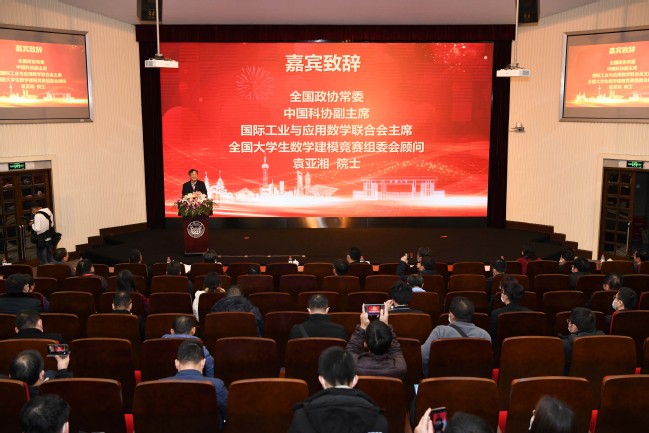
Yuan Yaxiang, member of the Standing Committee of the Chinese people's Political Consultative Conference, vice chairman of the Chinese Association for science and technology, CAS Member, chairman of the International Federation of industry and applied mathematics, consultant of the Organizing Committee of the National College Students' mathematical modeling competition, Wu Zongmin and Zhou Aihui, vice chairmen of the Chinese society of industry and applied mathematics, Chen Shuping, director of the Organizing Committee of the National College Students' mathematical modeling competition and leader of the expert group, Lu Peiming, vice president of Tongji University, Zhao Lixia, deputy director of the Higher Education Department of the Shanghai Municipal Commission of education, Cao Xinkang, President of MathWorks China, Xie Jinxing, Vice President of China Industrial and Applied Mathematics Society, Secretary General of the Organizing Committee of the National College Students Mathematical Modeling Contest, Lu Liqiang, Secretary General of Shanghai Industrial and Applied Mathematics Society, and heads of the Undergraduate College and College of Mathematical Sciences of Tongji University attended the award ceremony.
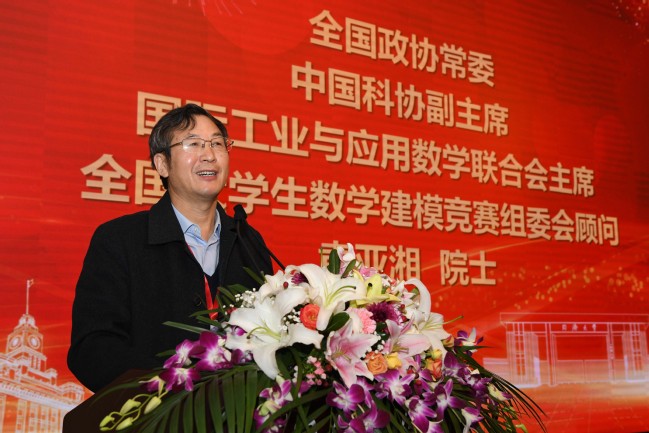
Academician Yuan Yaxiang congratulated all the winners in his speech. He said that he was very pleased to see that the National Undergraduate Mathematical Modeling Contest was getting better and better, and it was influencing more and more at home and abroad. China attaches great importance to the basic research of mathematics and the construction of the basic disciplines of mathematics. Last year, four ministries and commissions jointly issued a document calling for strengthening the scientific research of mathematics, which is of great use. It is hoped that the students can cultivate their love for mathematics and their ability to understand and solve problems with mathematical methods by participating in the competition. They are expected to solve the troublesome issue of China's key core technology with mathematics after taking up their jobs.
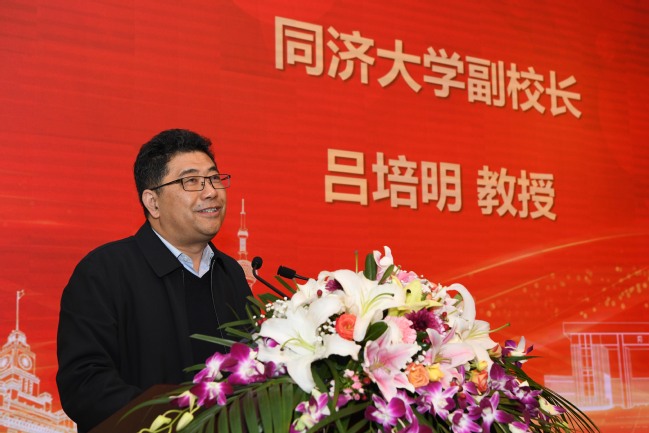
Wu Zongmin said in his speech that the National Undergraduate Mathematical Modeling Contest has been held for 29 times so far, which has developed into one of the largest and most widely participated extracurricular scientific and technological activities for college students in China. The competition is closely linked to the forefront of scientific and technological development, emphasizing the integration of theory with practice, and focusing on innovation ability and teamwork spirit. It is of great significance to cultivate and improve college students' confidence in innovation and creation, scientific thinking, mastering scientific methods, understanding society, and solving practical problems. Over the past 29 years, millions of college students have benefited from the contest, grown up and become talents.
Lv Peiming said in his speech that Tongji University attaches great importance to basic teaching and the training of mathematical talents, especially the training of science and engineering talents in their mathematics teaching. In recent years, the university has strengthened the construction of mathematics discipline, which shows a good momentum of development. Under the current background of vigorously developing artificial intelligence, the university will further strengthen the construction of mathematics discipline, step up the construction of "Intelligent Computing and Application" mathematics center of Tongji University, and lay a solid foundation for the cultivation of science and engineering talents of the university.

The National Undergraduate Mathematical Modeling Contest is held once a year and was founded by the Chinese Society of Industrial and Applied Mathematics in 1992. The competition has become the largest mathematical modeling competition in the world and one of the first 19 competitions selected in the "Ranking List of University Competitions". This year's event was held from September 10 to 13, attracting more than 130000 students from 45680 teams (41826 undergraduate groups and 3854 junior college groups) from 1470 universities or campuses in 33 provinces, cities, autonomous regions of China, the United States, the United Kingdom and Malaysia.
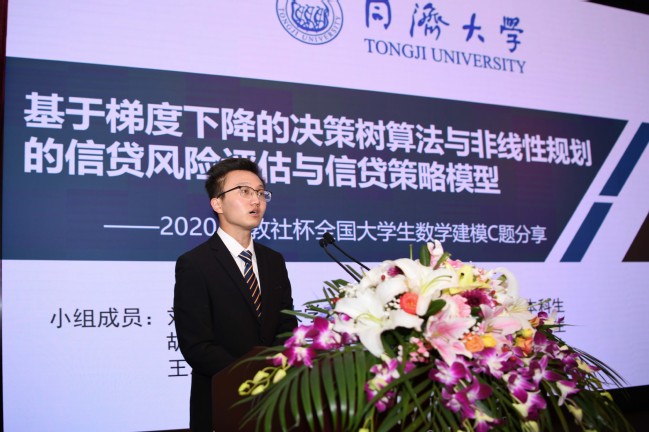
The competition is required to be held in a group of three participants. The participating team should analyze and solve the actual problems involved in a competition question within three days, discuss the rationality of the results, the scientificity and correctness of the model, and possible problems, and give corresponding evaluation based on the analysis and calculation results, and finally write a research paper with clear structure and conclusions. The topics of the competition are all simplified adaptations of practical problems in the fields of science and engineering technology, humanities and social sciences. There are no pre-determined answers to the questions, and the evaluation criteria are the rationality of assumptions, the creativity of modeling, the correctness of results and the clarity of presentation.
After two rounds of evaluation by experts from all competition areas and the whole country, 1691 teams were selected to win the National Award. Among them, 292 won the first prize and 1201 won the second prize of the undergraduate group, respectively accounting for 0.70% and 2.87% of the total number of teams participating in the undergraduate group; There were 46 first prizes and 152 second prizes of the junior college groups, accounting for 1.19% and 3.94% of the total number of participating teams of the junior college groups respectively.
At the awarding ceremony, the representatives of the students who won the first and second prizes of the National Undergraduate Mathematical Modeling Contest were awarded prizes, the "Higher Education Press Cup" and the "MATLAB Innovation Award" were awarded to undergraduate groups and the junior college groups, and the "CNKI Research Award" was awarded. In addition, they also issued proposition certificates to four contest proponents, and awarded excellent organization work awards to eight competition areas, namely Tianjin, Shanghai, Zhejiang, Shandong, Hunan, Guangdong, Guangxi and Sichuan. The teams that won the "Higher Education Press Cup", "MATLAB Innovation Award" and "CNKI Research Award" made a report at the meeting and introduced the achievements.
The thesis title of three students, including Liu Jiaqi, who won the Higher Education Press Cup of the undergraduate group, is "Credit Risk Assessment and Credit Strategy Model Based on Gradient Descent Decision Tree Algorithm and Nonlinear Programming". Aiming at the credit problem of small and medium-sized enterprises, they optimized the decision tree model based on the improved gradient descent algorithm, established the enterprise credit risk assessment, judgment and prediction model, and then established a non-linear model based on the maximum return, the minimum risk, the minimum customer churn rate and other objectives, and solved it. Finally, they gave the optimal bank loan strategy. "The analysis of relevant factors is comprehensive and detailed, the model design is practical, the ideas are clear, the expression is accurate, and the results are reasonable." The paper has been unanimously recognized by national evaluation experts.
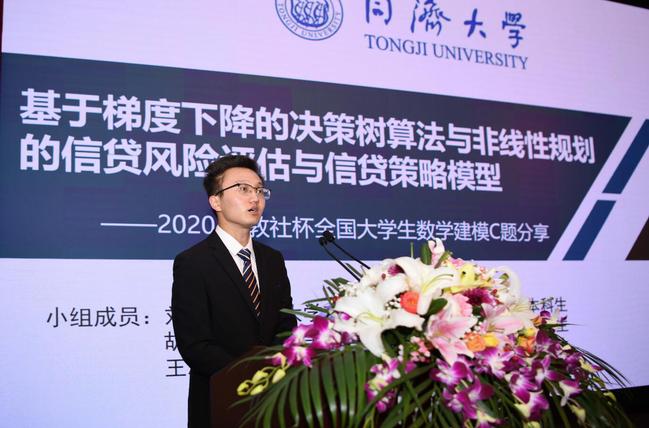
"In just 72 hours, each team has to make a choice among multiple problems and complete the whole process of problem analysis, modeling, solution, and standardized expression. This is a huge challenge for each team and an extremely important exercise." Liu Jiaqi said that the three students had once deeply participated in scientific research projects related to automatic driving visual perception along with their tutors in the college, and had known some advanced machine learning algorithms in the industry and academia at present. At the same time, their daily professional courses paid great attention to the processing and analysis ability of large volume data.
The other three undergraduate teams of Tongji University who won the first prize in the National Undergraduate Mathematical Modeling Competition were composed of Sun Nan from the College of Mechanical and Energy Engineering, Liu Yongtao from the College of Mathematical Sciences, Li Xiaolong from the College of Electronic and Information Engineering, Xu Jingning from the College of Software, Li Xinyi from the College of Civil Engineering, and Li Boyang from the College of Software, and Wang Zilu, Yangshan, and Li Lechen from the College of Electronic and Information Engineering.
Tongji University attaches great importance to the organization and training of college students' mathematical modeling competition, and takes it as an important starting point for training compound-type innovative talents to promote learning and teaching through competition. Every year from the end of April to the beginning of May, the university holds on campus mathematical modeling competition for all undergraduate and postgraduate students. In recent years, the number of teams participating in each session has exceeded 300. Affected by the epidemic situation this year, the mathematical modeling competition continued to be held online. The school organizes students to participate in the National Undergraduate Mathematical Modeling Contest in September every year, and there are generally more than 200 undergraduate teams; In February of each year, the school also organizes 70 to 80 student teams to participate in the American College Students Mathematical Modeling Contest. In recent years, our students have made great achievements in mathematical modeling competitions. Previously, Tongji University was shortlisted for three top prizes in the American Mathematical Modeling Competition held in February this year.
The College of Mathematical Science of our university has continuously built a team of experienced mathematical modeling instructors for many years, with about 20 instructors, who are responsible for the curriculum teaching, modeling training, competition organization, etc. of mathematical modeling. The mathematical modeling course of our school has been selected as one of the key courses in Shanghai, and it is also an excellent course that our university is making effort to establish. The school also bases itself on cross disciplines, cultivates compound innovative talents, and establishes a mathematical modeling engineering team, which has begun to take shape; In addition, there is a student association of the Mathematical Modeling Association.
Relevant officials of Tongji University said that this year, the university won the award of the Higher Education Press Cup of the undergraduate group, which is a fruitful result of the university's long-term adherence to training and strengthening students' mathematical foundation, solid promotion of interdisciplinary and curriculum integration, and continuous improvement of students' innovative application ability combining theory with practice.
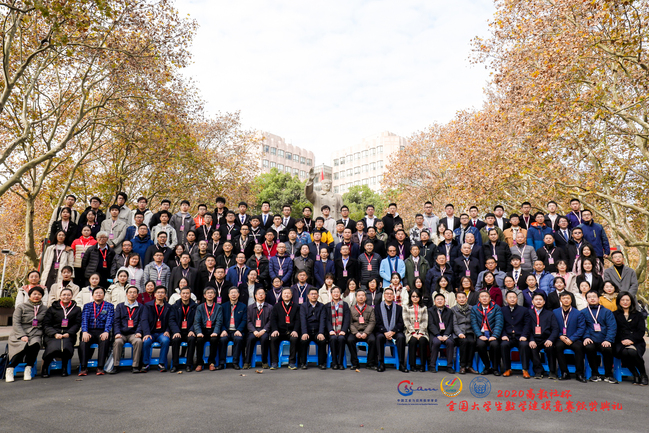
 Official wechat
Official wechat

 中文版
中文版